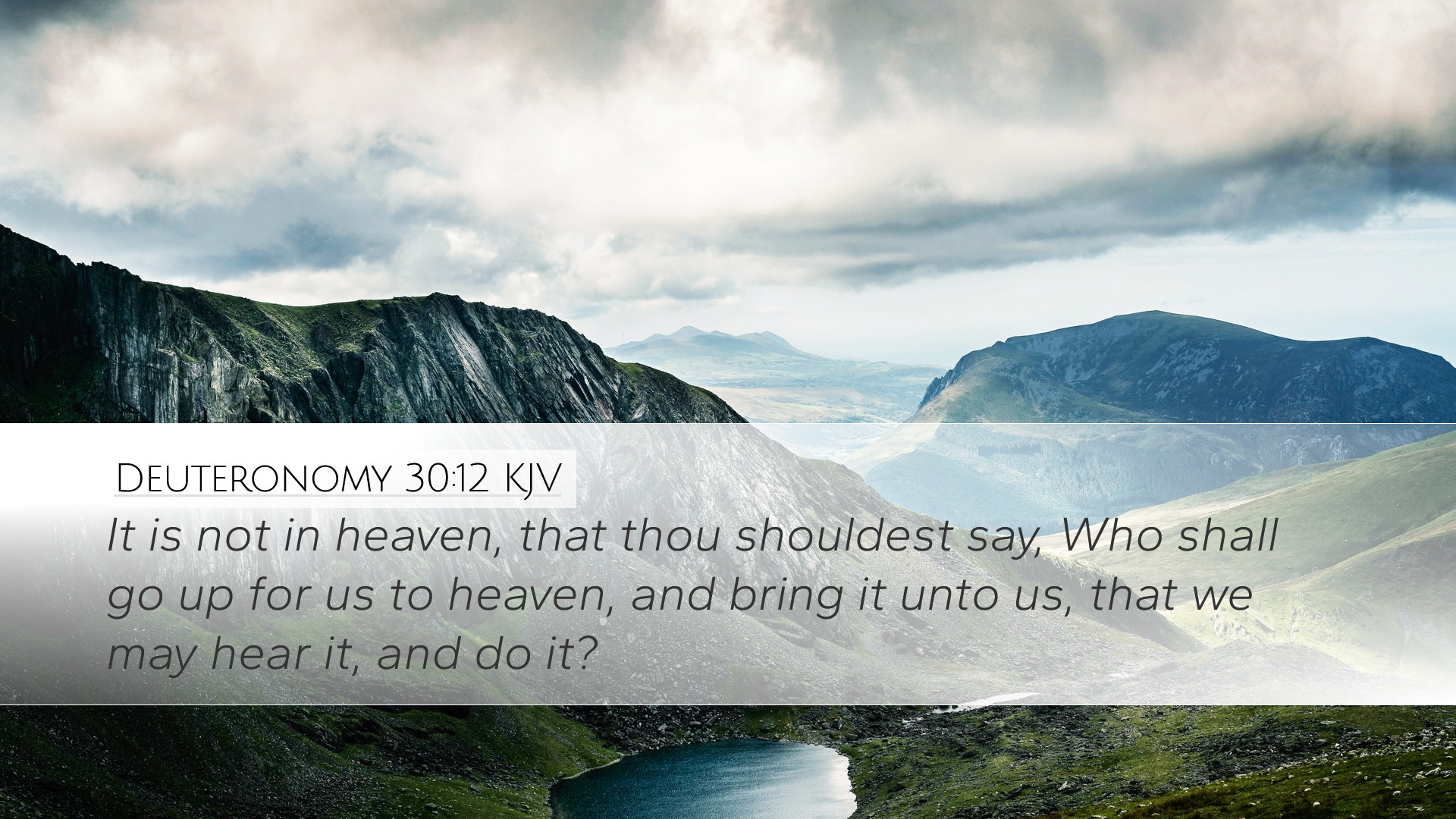Commentary on Deuteronomy 30:12
Verse Translation: "It is not in heaven, that thou shouldest say, Who shall go up for us to heaven, and bring it unto us, that we may hear it, and do it?"
Contextual Overview
The book of Deuteronomy stands as a pivotal text within the Pentateuch, serving as a reaffirmation of God's covenant with Israel as they stand poised to enter the Promised Land. The verse under consideration falls within Moses' farewell address and encapsulates the ease of access to God's commandments. Moses emphasizes that the divine directives are not beyond reach or comprehension.
Theological Insights
This verse initiates a profound dialogue about God's communication with humanity. Here, Moses conveys that the requirements of God are inherently accessible, debunking the notion that they are shrouded in heavenly obscurity.
- Accessibility of God's Law: As Matthew Henry notes, the emphasis here is on the immediacy of God's commands. They are not hidden away in the heavens, making it necessary for someone to ascend to obtain them.
- Human Responsibility: According to Adam Clarke, this verse underlines the responsibility of individuals to engage with God's Law. It suggests that the divine expectations can and should be understood and enacted in the daily lives of believers.
- The Immediacy of Divine Revelation: Albert Barnes highlights that God’s revelation is available to all who are willing to listen and act. It reflects God's desire for a relationship based on understanding rather than isolation.
Interpretation of Key Themes
This verse introduces several critical themes related to the nature of divine commandments and human engagement with them:
- Divine Clarity: There is a significant implication in this passage that God's Word can be understood without mystical intermediaries. As Clarke points out, the commandments can be perceived through the rational faculties provided by God.
- Accessibility and Obligation: The assertion that God's commandments are not in heaven emphasizes the moral obligation to pursue understanding and adherence. According to Henry, this access implies accountability for one’s actions.
- The Call to Action: The verse issues a call not only to hear but to "do" the commands. Barnes argues that this reflects a holistic view of faith that emphasizes both belief and action as integral components of piety.
Expositions from Commentators
Let us elaborate on some of the insights provided by esteemed commentators:
Matthew Henry: Henry interprets this verse in light of the broader context of God's covenant promises. He notes that God's requirements are clear, rooted in love and holiness, and accessible to His people. Henry emphasizes that pursuing knowledge of God's commandments is an essential part of cultivating a faithful life.
Albert Barnes: Barnes reflects on the implication of divine accessibility in relation to Israel's covenant. He suggests that God does not wish to keep His commands a mystery, but rather desires participation from His people in their fulfillment. This stands as a challenge to the contemporary reader to recognize the importance of engaging with Scripture directly.
Adam Clarke: Clarke emphasizes the impossibility of attaining God's truth through human effort alone. He reiterates that the understanding of divine laws is a grace-filled act. This reflection serves to highlight the need for the Holy Spirit in discerning the depth of God's intentions.
Application for Contemporary Believers
The principles derived from Deuteronomy 30:12 can be practically applied in today's faith communities:
- The Word of God as Accessible: Pastors and church leaders should encourage congregants that God's Word is available to them. It empowers individuals to study the Word, fostering personal growth and corporate worship.
- Cultivation of Understanding: Believers are called to engage actively in the interpretation of Scripture. This involves communal efforts in Bible studies, discussion groups, and theological education to deepen understanding.
- Prioritization of Action: Acknowledging the call to "do" reinforces that faith is not passive. This inspires movements of social justice, charity, and personal holiness as integral expressions of living out faith.
Conclusion
Deuteronomy 30:12 offers significant theological insights into the nature of God's commands and our relationship with them. The verse breaks down barriers of perception concerning divine revelation, calling believers into an engaged relationship with God's Word. As we reflect on its implications, we recognize the necessity for both understanding and action in our spiritual journeys. By making God's commandments the foundation of our lives, we respond with gratitude and faithfulness, fully realizing our covenant obligations.


